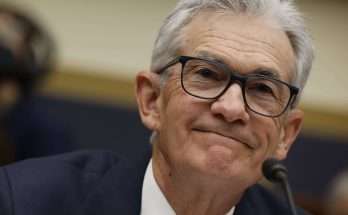
Changpeng Zhao, founder and CEO of Binance, speaks at the Blockchain Week Summit in Paris, France, on April 13, 2022.
Benjamin Girette | Bloomberg | Getty Images
PARIS — The crypto world may have turned a corner when it comes to regulation.
The bosses of several major crypto companies told CNBC regulators are beginning to take a more positive approach to digital currencies, following a numerous crackdowns targeting the space.
Whereas China has banned crypto outright, countries like the U.S. and Britain have announced moves to bring regulatory oversight to the nascent market.
“The tide is definitely turning,” Changpeng “CZ” Zhao, CEO of Binance, the world’s largest crypto exchange, told CNBC on the sidelines of Paris Blockchain Week Summit.
Last year, U.K. regulators barred Binance from undertaking any regulated activity in the country, while in Singapore, Binance limited its services after the central bank warned it may be in violation of local regulation.
In a speech kicking off the event Wednesday, Zhao said regulatory discussions around crypto have shifted from “negative” to “positive.”
Before Zhao was introduced, the MC for the event referenced the crypto slang term “wagmi,” which stands for “we’re all gonna make it.”
“To be honest, I feel we kind of did make it,” he said, adding crypto serves as a lifeline for some in Ukraine amid Russia’s invasion.
But the crypto world still has some way to go before reaching widespread acceptance. And the fate of the industry largely hinges on the approaches that will be taken by different global regulators.
Governments taking action
“The regulatory landscape around the world is coming up to speed quickly,” Nicolas Cary, co-founder of crypto wallet maker Blockchain.com, told CNBC.
The U.K. government last week announced it would bring stablecoins — digital assets that track the prices of existing currencies like the U.S. dollar — into the local payments regime.
British Finance Minister Rishi Sunak has also asked the Royal Mint, which is responsible for producing the country’s coins, to create a non-fungible token, or NFT, the crypto world’s answer to rare collectible items.
“The U.K. could be a dark horse in this whole situation,” Cary told CNBC.
“Post-Brexit, they sort of have a policy decision to make and a strategy decision to make,” he added. “Do they rebuild Brussels in London, or do they become the Singapore of the West, invite all this innovation, all this technology and all this wealth generation and really own the future of the Web?”
Governments want to foster innovation around financial markets and the next possible generation of the internet, known as “Web3,” crypto execs told CNBC.
But they’re also cautious about the dark side of the industry, including money laundering and other illegal transactions, and the impact of energy-intensive bitcoin mining on the environment.
In the U.S., President Joe Biden recently signed an executive order urging government-wide coordination on digital assets. A key concern for Western regulators, industry insiders say, is the use of digital assets for Russian sanctions evasion.
“I think they’re starting to take it seriously [but] I don’t think they’re getting a warm and fuzzy feeling about it,” Arthur Breitman, a co-founder of Tezos, a blockchain protocol rivalling Ethereum, told CNBC.
“Naturally, they are going to have a conservative bias,” Breitman said. However, only a “tiny fraction” of crypto payments is related to criminal activity, he added.
Illegal activity accounted for less than 0.2% of digital currency transactions in 2021, according to data from blockchain analytics firm Chainalysis.
Charm offensive
France is “very progressive and very welcoming towards cryptocurrencies,” Binance’s Zhao told CNBC. “They are far more advanced in their understanding.”
Binance turned on the charm in Paris this week, announcing a “Web3 and crypto” start-up accelerator program in partnership with the business incubator Station F.
It comes as the company, which has previously boasted about having no official headquarters, is now on the hunt for a global main office.
“We will definitely have our regional headquarters for Europe in Paris,” Zhao said. “We will establish a number of regional headquarters first before going global.”
Binance now has licenses in Bahrain and Dubai, and provisional approval in Abu Dhabi. In Europe, it is supervised by Lithuanian anti-money laundering regulators and is seeking registration with Sweden’s financial services watchdog.
The U.S. falling behind?
Not all regulators are on board with the rapid growth of crypto, according to Brad Garlinghouse, CEO of blockchain firm Ripple.
The U.S. Securities and Exchange Commission has taken Ripple, Garlinghouse and co-founder Chris Larsen to court over allegations they illegally sold over $1 billion worth of the cryptocurrency XRP.
The SEC contends XRP should be considered a security, a claim that Ripple disputes.
“When I give advice to entrepreneurs that are thinking about building a crypto or blockchain company, I tell them do not incorporate in the United States,” Garlinghouse said. “The lack of clarity and a lack of certainty means that you are at risk for the exact kind of lawsuit the SEC brought against us.”
Ripple is even considering moving its headquarters abroad, with London and Singapore among the potential candidates.
“Ripple will hire north of 300 people this year, and more than half of them will be outside the United States,” Garlinghouse said.


